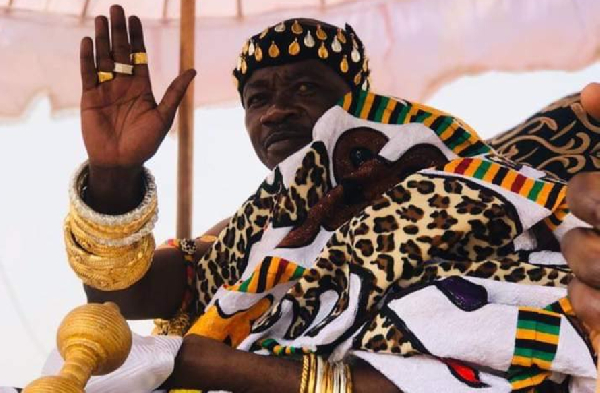Mishandling of Corpse at Funerals: Tepahene details spiritual implications of practice

The Omanhene of Tepa in the Ashanti Region, Nana Adusei Atwenewa Ampem I, has cautioned the youth against the recent trend of mishandling dead bodies during funeral rites.
Speaking to the recent practice that is gaining popularity in Ghana in an exclusive interview with GhanaWeb, on April 29, 2025, the Tepahene warned of spiritual implications of the growing trend.
According to the traditional leader, the act constitutes a desecration of the body of the deceased in a way that has far-reaching implications.
“Such treatment of the deceased who should be ushered peacefully to the afterlife end up being desecrated by this bad practice creeping into our funeral settings.
“Such an act is outrightly considered a desecration of the body of the deceased – which is considered sacred in many cultures and religions and must not only be condemned but stopped,” he said.
He stated that the practice reveals a clear disconnect of the youth from the Ghanaian traditions and cultural essence.
He indicated that the blatant disregard for culture by the youth could be fueling the practice which spiritually disturbs the deceased, who is guided to transition into the next life through rituals performed during funeral rites.
“The practice causes disturbance to the spirit of the deceased, hence preventing them from moving on to the afterlife.
“It releases negative energies or malevolent spirits into the community – so, the youth must be wary of their actions when undertaking such anti-cultural practices during the funeral rites,” he added.
Quizzed on why authorities have remained silent on the trend, Nana Adusei Atwenewa Ampem remarked that it could possibly be happening on the blind side of traditional rulers.
“It is good that this concern is being highlighted by the media because traditional authorities may not be aware of the extent of the issue and its impact in our communities,” he said.
He added that the trend could also be festering because authorities, including traditional leaders and family heads fear stirring conflicts – and hence may avoid the topic altogether.
“It could be that leaders in our communities might be avoiding the topic to prevent conflict with perpetrators who may be living in the same vicinity with them,” Tepahene suggested.
He added that some traditional authorities, including family heads, might feel they lack the power to effect change.
He has, consequently, called for a heightened advocacy on the matter.
He particularly urged traditional leaders to enforce existing public health guidelines and protocols and available legal instruments to curb the trend.
“Existing laws on public health must begin to bite. Where the laws may not have jurisdiction, traditional and community heads could take it upon themselves to develop guidelines to ensure dignified handling of corpses. They must ensure that all persons respect cultural and religious traditions regarding the treatment of corpse at funerals.
“Faith-based organisations who lead community education programs must up their game by raising awareness about the importance of treating the deceased with dignity and respect. Community engagements should also prioritise the promotion of cultural values and traditions that respect the deceased,” he stressed.
He further called on relevant bodies to launch monitoring and reporting systems to fish out perpetrators of this practice and bring them to book to ensure sanity at funerals in communities.
Meanwhile, the Public Health Act 2012 section 851 makes clear provisions for the proper handling of dead bodies to protect public health and dignity.
Similarly, the criminal offenses Act 1960 section 29 criminalises the mishandling of dead bodies especially when such actions pose public health risks.
Source: www.ghanaweb.com





